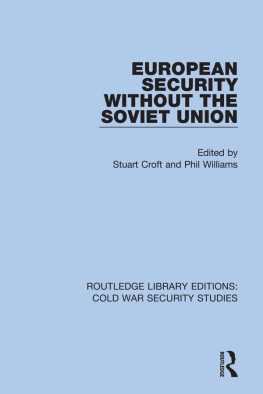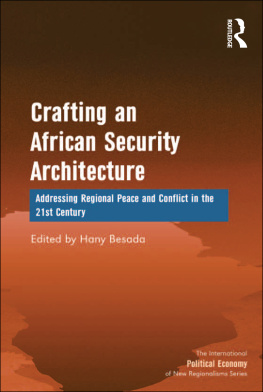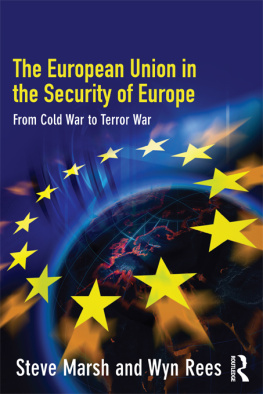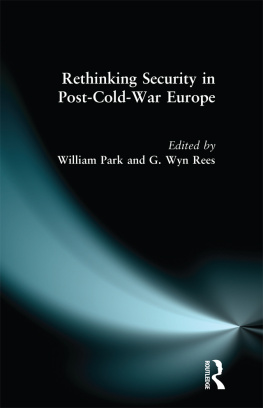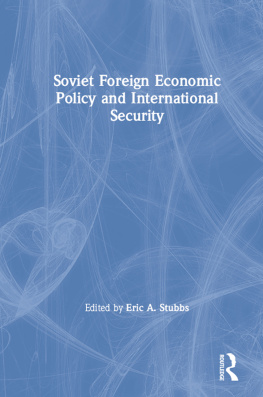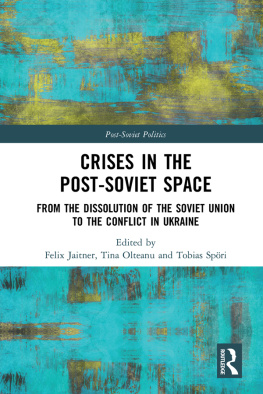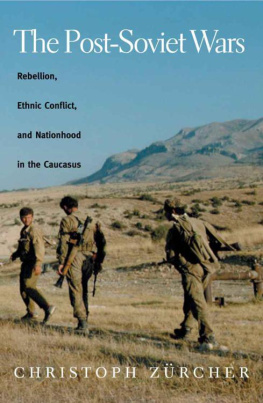Ethnic Nationalism and Regional Conflict
Ethnic Nationalism and Regional Conflict
The Former Soviet Union and Yugoslavia
Edited by
W. Raymond Duncan and G. Paul Holman, Jr.
First published 1994 by Westview Press
Published 2018 by Routledge
52 Vanderbilt Avenue, New York, NY 10017
2 Park Square, Milton Park, Abingdon, Oxon OX14 4RN
Routledge is an imprint of the Taylor & Francis Group, an informa business
Copyright 1994 by Taylor & Francis
All rights reserved. No part of this book may be reprinted or reproduced or utilised in any form or by any electronic, mechanical, or other means, now known or hereafter invented, including photocopying and recording, or in any information storage or retrieval system, without permission in writing from the publishers.
Notice:
Product or corporate names may be trademarks or registered trademarks, and are used only for identification and explanation without intent to infringe.
A CIP catalog record for this book is available from the Library of Congress.
ISBN 13: 978-0-367-01669-2 (hbk)
As this book goes to press, ethnic nationalism's impact can be seen throughout the former Soviet Union and Yugoslavia. When President Boris Yeltsin dissolved Russia's parliament in September 1993, many of its members and outside supporterssome xenophobic Russian nationalists, others left-over communists or monarchistsjoined ranks to destabilize Yeltsin. In early October, the ensuing street violence between such parliamentary backers and Yeltsin's riot police brought the city of Moscow to its most extreme instability since the 1917 Revolution. Anti-Yeltsin turbulenceled by a core of armed parliament defenders with far-right Russian nationalist credentials (volunteers from the Russian National Unity movement)ended only when Yeltsin called for military reinforcements to crush the rebellion.
In the former Soviet Union, Georgia's leader, Eduard Shevardnadze, narrowly escaped death in late September 1993 when the key Georgian provincial city of Sukhumi fell to nationalist Abkhazian forces. Shevardnadze blamed Russian military groups for backing Abkhazian separatists, vowing to avenge the defeat. Indeed, it appears that Russian forces supplied tanks and other military equipmentincluding "volunteers" to Abkhazian rebels who drove Georgian Government forces backing Shevardnadze from Sukhumi.
Not surprisingly, the Russian Foreign Ministry has called for expanded United Nations help in peace-keeping in the troubled ethnic conflicts of the former Soviet Union.
These and other ethnic conflicts examined in this volume indicate how turbulent the world has become in the post-Cold War eraand how difficult it has been to craft western security policies to address the turmoil. North Atlantic Treaty Organization (NATO) allies have been tragically unable to orchestrate an effective policy to quell the violence in the former Soviet Union and Yugoslavia, as our case studies on these regions, especially former Yugoslavia, so vividly illustrate. The future of western security policies is blurred, despite the Clinton Administration's acknowledgment that a major aspect of the current era is, as Anthony Lake, National Security Adviser, has stated, "an explosion of ethnic conflicts."
We hope our studies of ethnic conflict will shed light on the regional dynamics unfolding in the former Soviet Union and Yugoslavia and stimulate new thinking about international security. The issue clearly affects U.S. foreign policy as America sorts out its primary and secondary priorities in the post-Cold War world, especially given its past quagmires in Vietnam and Lebanon.
W. Raymond Duncan
G. Paul Holman, Jr.
Notes
See The Christian Science Monitor, October 4, 1993, p. 3.
The New York Times, October 7, 1993, p. A9.
Conversation with Professor Melvin Goodman, National Defense University, October 1, 1993. Professor Goodman is coauthor of a forthcoming biography on Shevardnadze (with Lyn McGiffert Ekedahl).
The New York Times, October 7, 1993, p. A9.
The New York Times, September 29, 1993, p. A11. The appeal was made by Andrei V. Kozyrev, Russia's Foreign Minister.
The New York Times, October 5, 1993, p. A12.
The New York Times, October 7, 1993, p. A15.
Anthony Lake, "From Containment to Enlargement," speech at Johns Hopkins University, School of International Studies, September 21, 1993.
On emerging constraints to U.S. participation in regional peace-keeping, see President Clinton's address to the 48th session of the UN General Assembly, September 27, 1993.
This study is the product of a conference held at the Naval War College, Newport, Rhode Island, in April 1993. The authors would like to thank RADM Joseph Strasser, president of the Naval War College, for his unstinting support in organizing this conference, as well as all the professors, staff, and students in the National Security Decision Making Department (NSDM) who participated in conference planning and discussions. In this group, Christine Anderson, NSDM Department, stands out for her superhuman efforts in organizing the April conference.
We are especially grateful to a number of individuals in the NSDM Department for their comments on the manuscript during its various drafts, notably Col. D.T. Buckwalter, Col. J.J. Sullivan, Col. Allan Ricketts, Capt. Bill Calhoun, Col. Chris Eyler, Gary Misch, Bobby Childress, and Michael Corgan. We also are pleased to thank Dr. Melvin Goodman of the National Defense University in Washington, D.C., for his insight, Cathy Stanmeyer for reading parts of the manuscript, and Norman Frisch for his outstanding work on the maps. Responsibility for the final chapters naturally remains the authors'.
The staff of the Document Preparation Center, State University of New York, College at Brockport, devoted enormous time and effort in preparing the manuscript for publication. Jeanne Saraceni was especially helpful, as was Lori Lingg, and Pamela Rowles. Without their efforts, we surely would have been lost in terms of getting the manuscript published in a reasonable length of time.
Finally, we want to express our appreciation to three individuals who helped bring this project to fruition. Rebecca Ritke, senior editor at Westview Press, and her assistant, Carol Jones, expedited the manuscript in a professional manner, and Ann Goodman of the Central Intelligence Agency made heroic efforts in locating suitable maps for the book.
W.R.D.
G.P.H.
W. Raymond Duncan and G. Paul Holman , Jr .
Nationalism is not necessarily a negative phenomenon in contemporary world affairs. By forging identity with "a people" as the central focus of loyalty, nationalism can serve as a basis for collective solidarity to legitimize governing institutions and stimulate economic growth. Indeed, post-World War Two West Germany and Japan illustrate how patriotic devotion to one's country unifies and mobilizes individuals for remarkable economic and political development. In short, nationalism is inherently neither good nor bad, but a fact of life that shows a capacity for both good and evil.
Still, when one nation glorifies itself at the expense of othersas in national chauvinism, jingoism, xenophobia, fascism and other doctrinesit becomes a negative force in world politics. Nationalism in Germany and Japan during the inter-war period and World War Two, with its xenophobic feelings of superiority vis--vis other national groups, illustrates the point. Although not an evil in and of itself, then, nationalism has the potential to stir up trouble.


